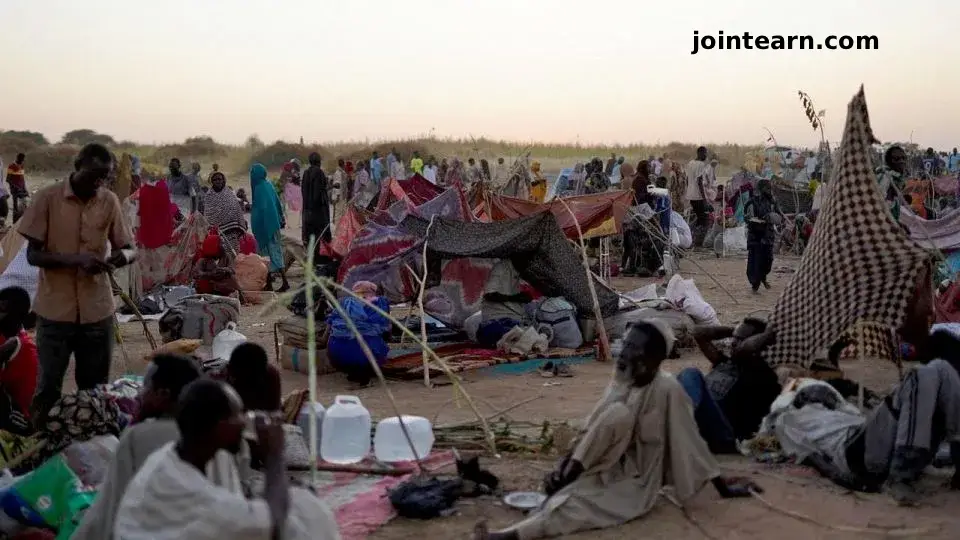
The Rapid Support Forces (RSF), Sudan’s notorious paramilitary group, have been accused of committing mass killings and atrocities in the city of El-Fasher after seizing control from the Sudanese army. Verified videos, satellite images, and survivor testimonies have revealed shocking evidence of executions, massacres inside hospitals, and systematic attacks on civilians trapped in the besieged city.
Graphic Videos Show Executions in El-Fasher’s Medical School
A chilling video shared by RSF fighters themselves shows an elderly man surrounded by dozens of bodies before being shot at close range by an armed fighter. CNN verified the footage’s location at El-Fasher University’s School of Medical Laboratory Science, directly across from the Saudi Hospital, where more than 460 people were reportedly killed according to the World Health Organization (WHO).
The Sudan Doctors Network (SDN) said the RSF “cold-bloodedly killed everyone inside the Saudi Hospital, including patients, their companions, and medical staff.” Satellite imagery analyzed by experts shows large clusters of bodies and areas stained with blood around the hospital grounds.
The RSF has denied the allegations, calling them “fabricated narratives,” yet its own videos show fighters boasting and celebrating among the dead.
Evidence Mounts as UN Warns of Mass Atrocities
Reports of RSF fighters committing large-scale massacres emerged within hours of the army’s withdrawal from El-Fasher. Satellite images, survivor accounts, and social media videos now paint a clear picture of systematic violence.
RSF commander Mohamed Hamdan Dagalo (Hemedti) admitted there had been “violations” and announced an internal investigation. However, human rights experts and UN officials have dismissed the move as an attempt to deflect responsibility.
The United Nations estimates that 120,000 civilians remain trapped in El-Fasher—half of them children—without access to food, water, or medical aid. The city had been under an 18-month siege before its fall.
Hospitals Turned Into “Killing Grounds”
Eyewitnesses describe El-Fasher as a “human slaughterhouse.” Survivors said RSF fighters executed patients and doctors, looted hospitals, and hunted civilians fleeing through the city’s rubble-strewn streets.
In several verified videos, RSF fighters are seen shooting unarmed civilians and shouting commands like “Catch the girls,” suggesting targeted gender-based violence. Humanitarian workers confirm multiple cases of rape and sexual assault against women and girls who fled the city.
Satellite analysis from Yale’s Humanitarian Research Lab found evidence of mass graves and blood-stained terrain, confirming the location and timing of the killings. “El-Fasher has effectively become a kill box,” said the lab’s executive director, Nathaniel Raymond. “The city was walled in by the RSF, trapping civilians who are now being systematically executed.”
Survivors Speak of Terror and Loss
Refugees reaching Tawila, about 60 kilometers away, recount horrific scenes. “The RSF entered and destroyed everything,” said Manal bint Abi Suleiman, who fled with her children. “They separated the young men from the women. I don’t know where they took the men—God only knows.”
Others described being beaten and robbed as they ran for their lives. Adam Rojal, spokesperson for the General Coordination for Displaced Persons and Refugees in Darfur, said people were being “executed in the streets” and their property confiscated.
Humanitarian agencies say most of the displaced are women and children, while thousands of men are missing or presumed killed. “The majority of those arriving in Tawila are widows, mothers, and orphans,” said Francesco Lanino of Save the Children. “Men are being kidnapped or executed based on ethnicity.”
Widespread Sexual Violence and Extortion
According to survivors and aid workers, the RSF and allied militias have been raiding homes, abducting civilians, and demanding ransom payments. Sheldon Yett, UNICEF’s representative in Sudan, said fighters were “dragging people out of their homes, telling them to call relatives for money—or die.”
The Sudan Doctors Network reported that six medical workers, including four doctors and a nurse, were kidnapped and are being held for ransom, with the captors demanding 100 million Sudanese pounds ($166,000) each for their release.
International Outrage and Demands for Accountability
The United States, United Nations, and major human rights organizations have condemned the killings in El-Fasher as potential war crimes and crimes against humanity.
Former US Secretary of State Antony Blinken previously accused the RSF of genocide against non-Arab ethnic groups in Darfur, citing systematic killings and sexual violence. “Men and boys—even infants—were targeted on an ethnic basis,” Blinken said earlier this year.
UN agencies are calling for an immediate ceasefire and independent investigation into the atrocities. “The fact that the RSF records itself committing these crimes demonstrates total impunity,” said Yett. “We need international accountability now.”
Humanitarian Crisis Worsens Across Sudan
The civil war in Sudan, which began in April 2023, has already killed over 150,000 people and displaced more than 12 million, making it one of the world’s worst humanitarian disasters.
The RSF, originally formed from the Janjaweed militias, now controls nearly all of western Sudan, including Darfur. The Sudanese Armed Forces (SAF) retain parts of the east and north, while millions face famine, disease, and displacement.
Calls for Global Action
Aid organizations warn that without swift international intervention, the atrocities in El-Fasher could be repeated across North Kordofan, Blue Nile, and other conflict zones.
“This is a genocide unfolding in real time,” said an IRC official. “Sudan is being erased town by town.”
As satellite images, videos, and eyewitness reports continue to emerge, the international community faces mounting pressure to impose sanctions, open humanitarian corridors, and bring those responsible—both RSF and SAF—to justice.


Leave a Reply